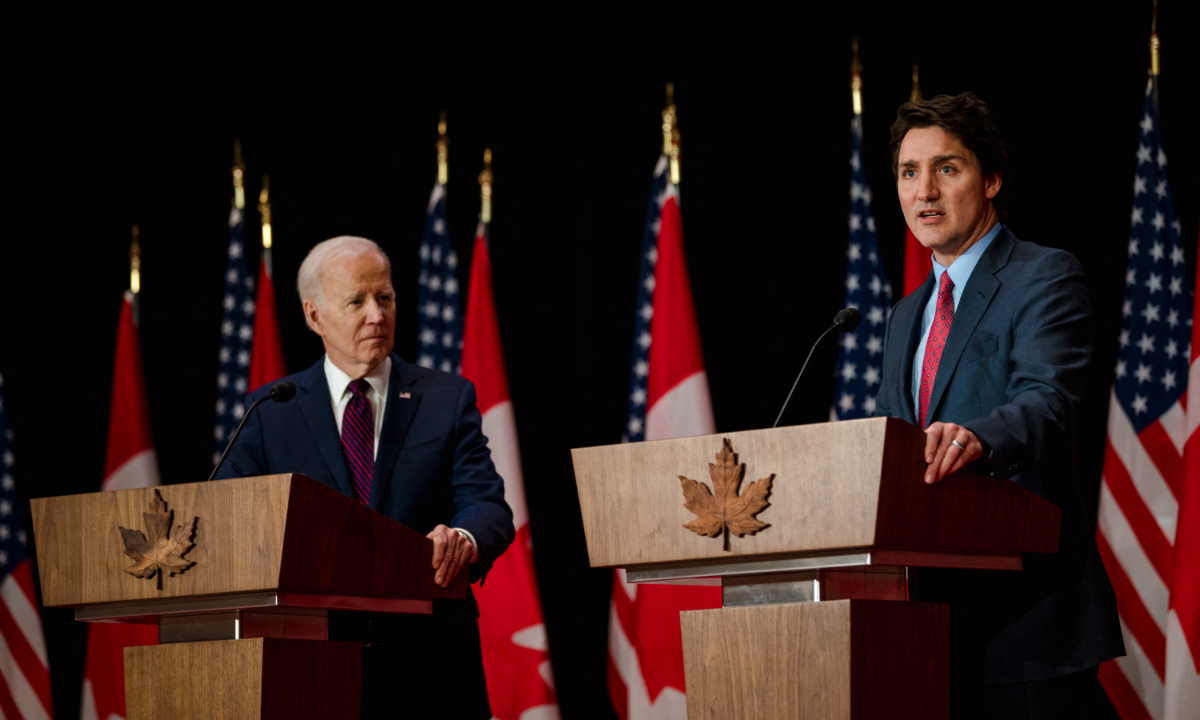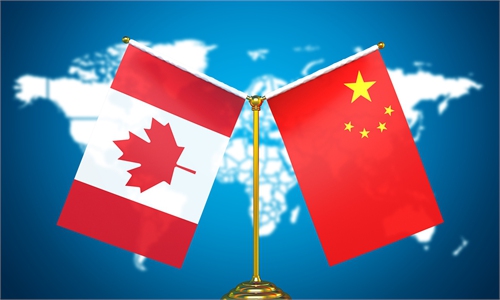
US President Joe Biden and Canada's Prime Minister Justin Trudeau hold a joint press conference in Ottawa, Canada, on March 24, 2023. Photo: AFP
Canadian tourism insiders and media outlets have expressed concern over a competitive disadvantage in the travel industry after finding out that Canada failed to make the list of the latest destinations that China resumed group tour services to. But Chinese observers pointed out that Canada's current exclusion is entirely self-inflicted.
The Chinese Embassy in Canada attributed the decision to Canada's hype of "Chinese interference" and rampant and discriminatory anti-Asian acts. Experts point out that Canada's absence from the list is entirely self-inflicted and is a result of its attitude toward China in recent years.
One week ago, China announced a third round of resumptions of outbound group tour services to 78 countries and regions, including the US, Japan, South Korea, Australia, India and most European countries, expanding the scope from 60 to 138 countries and regions. Canada was noticeably absent.
According to data released by online travel platforms later on the day of the announcement, the average increase in popularity for the specified overseas destinations after the announcement exceeded 150 percent.
It is "another blow to tourism business owners" in Canada that have had a rough few years because of restrictions related to the pandemic, said Beth Potter, president and CEO of the Tourism Industry Association of Canada, as quoted by Canadian media outlet CTV News.
As quoted by Canadian media outlets CBC and CTV, the Chinese Embassy in Canada explained the decision, saying that "lately, the Canadian side has repeatedly hyped up the so-called 'Chinese interference,' and rampant and discriminatory anti-Asian acts and words are rising significantly in Canada."
"The Chinese government attaches great importance to protecting the safety and legitimate rights of overseas Chinese citizens and wishes they can travel in a safe and friendly environment," the embassy was quoted as saying.
Spokespersons for the Canadian foreign affairs and tourism ministers said the government is aware of Canada's omission from China's list of approved destinations, as well as the Chinese embassy's recent public statements, CBC reported Wednesday.
It's not surprising that Canada is worried about the absence of Chinese tour groups. According to the World Tourism Organization, China had become the world's largest source for outbound tourists before the COVID-19 pandemic. In 2019, Chinese tourists spent a total of C$255 billion ($189 billion) on international travel.
In 2019, China was Canada's largest source of tourist arrivals from the Asia-Pacific region and Canada's second-largest long-haul market after the UK. China also used to be Canada's largest market in terms of how much its tourists spend, CBC reported.
Approved group tours of Chinese tourists to Canada began in 2010. In 2018, a record 757,000 Chinese travelers visited Canada and spent C$2 billion, according to Statistics Canada. According to Canada China Business Council, every Chinese tourist spent C$2,600 on average.
Tour groups are an important factor that can drive tourism outside the country in the aftermath of the pandemic, Xia Guohan, founder and director of Zonghengce Strategy Institute and Research fellow of Charhar Institute, told the Global Times on Thursday.
The contribution tourists make comes not only from spending, but also in improving the impression of the people on both sides of each other's countries, as well as bringing in more investment, Xia said.
"Considering that Canada is an immigrant country, foreign investment is what Canada values most, so it is very keen on group tours from China," he said, noting that Canada has been repeatedly hyping this issue through media in order to put pressure on China, and to form a kind of "moral abduction."
However, the scholar pointed out that Canada's current exclusion from China's list is entirely self-inflicted.
China-Canada relations took a sharp turn for the worse in 2018 when the Canadian government arrested Huawei's chief financial officer Meng Wanzhou at the request of the US government as she was transiting a flight in Vancouver.
Bilateral relations have never been quite fixed since, and private attitudes toward Chinese people are also less than favorable, especially due to the constant negative coverage of China in the Western media, the expert said.
While many analysts believe it is unlikely that China and Canada will see a rapid warming of bilateral relations in the short term, if Canada makes a China-friendly political statement in a formal setting, China might reconsider sending tourists to Canada, observers noted.

